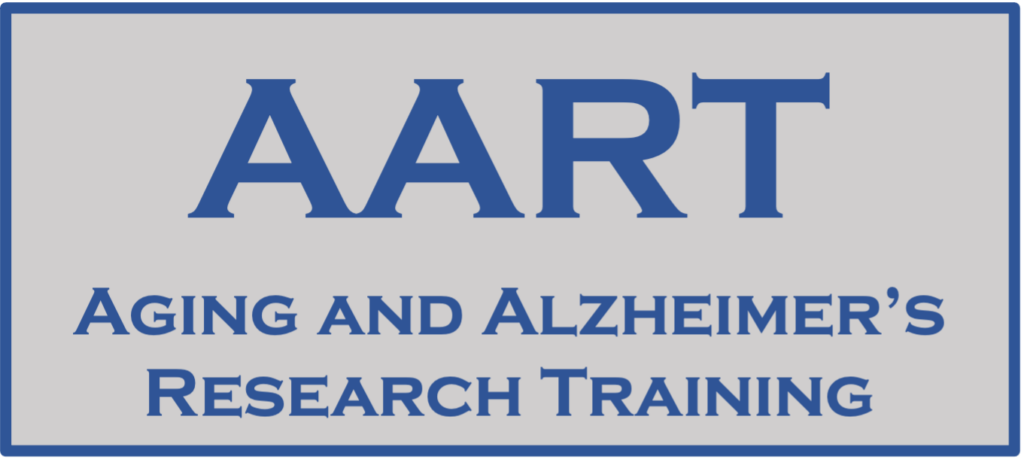

The AART program aims to ensure that trainees are knowledgeable about research approaches, aware of clinical aspects of aging and AD, adept in their research presentations, and successful at conducting their research. Progress of the trainees will be followed through informal roundtable discussions throughout the year, and through regular tracking of competencies. The program director will have short meetings with mentor-trainee pairs every six months to check that everyone’s expectations are being met. The size of the cohort of trainees (7-8; T32 Table 7) will also provide an environment where students and fellows experiencing trouble in their research and training will be recognized early, helping alleviate problems that may occur.
Overview of required opportunities: In order for students and fellows to become successful scientists who continue to pursue work in AD and aging, we developed a series of required events. To reiterate: these events will complement the main emphasis on individual mentored research. All of these opportunities, led by AART faculty members, are described in more detail after this list, and throughout the proposal:
1. Clinical Experience. At least once per semester, trainees will visit the Memory Disorders Program with Dr. Scott Turner (an AART faculty member) or a nurse practitioner as patients are being seen or clinical trials are being run or attend a weekly meeting discussing research studies and clinical cases (there are always clinical trials that are being discussed. At least once each year, trainees will also attend a brain cutting by the director of Neuropatholgy, Dr. Brent Harris (also an AART faculty member). Dr. Harris and Dr. Turner also conduct Clinical-Pathological Conferences to investigate correlations of what is observed clinically with what is observed pathologically.
2. Coursework. AART students are required to take the course, “Molecular Mechanisms of Neurodegeneration” in their second year of PhD training. This course has a strong component examining normal aging and brain dysfunction from a research perspective. Other aging-related courses are available as electives and trainee teaching opportunities.
3. Biostatistics. Proper experimental design, quantitative analysis, tests of data reproducibility, and skepticism of outcomes are all necessary skills of scientists. These skills depend on a solid and facile understanding of biostatistical concepts, which will be developed through a series of workshops that include both teaching of the principles and interactive sessions the include data from the trainees.
4. AD Research Center seminar series. Johns Hopkins University runs a Dementia Consortium series via zoom. Trainees are required to attend these monthly seminars, which approach issues of Alzheimer’s disease from many angles as required by the ADRC system.
5. Grant writing. All students and fellows develop F, K, or R-series grant proposals for submission to the NIH. Initial training in this endeavor makes use of successful awards previously received by trainees. Drafts are reviewed by individual AART mentors and by other members of the AART training program. A regular portion of Roundtable discussions is dedicated to improvement in grant writing.
6. Meetings. Students and fellows keep current of advances in the research area through national and international meetings, presenting at these meetings whenever possible. Attendees report on these meetings to the rest of the individuals in AART training program on interesting new findings.
7. Weekly Journal Clubs. All trainees are required to attend a weekly journal club. Depending in the size of the journal club, trainees present scientific papers at least once per year. All journal clubs include regular emphasis on biostatistics, and once per semester include a paper relating to some aspect of science rigor and reproducibility.
8. Summer symposium. Students and fellows present their research at the yearly Healthy Aging Symposium, either in oral presentations or in poster sessions. This symposium includes internal and external presenters from the larger Georgetown and Washington DC communities (including Howard University and the NIA). One aim is to promote research collaborations among participating labs. All AART trainees will receive feedback from AART faculty about how to present their work succinctly, how to stress the justification for the research, and how to explain data images (and not just conclusions).
9. Data curation. Data curation is an important and sometimes difficult aspect of research, and AART trainees will learn about ways to: collect and store data during experiments for later analysis; annotate the data to prevent misidentifications; upload data for accessibility both within the lab and beyond to the greater community; and access similarly curated data from other studies to allow large datasets to enrich their own research questions.
10. Roundtables for writing instruction, cohort building, and discernment of trainees’ AART experiences. AART trainees and the program director have roundtable meetings three to four times each semester, providing extensive writing training, education on aging and AD, and oversight of trainees. These meetings also allow trainees to discuss their individual research projects and reflect on their AART training. This reflection is a hallmark of Jesuit pedagogy, and an integral part of the Georgetown education.

Supported by NIH T32 AG071745; Georgetown Center for Healthy Aging
Contact: G. William Rebeck, PhD
Professor, Dept of Neuroscience
